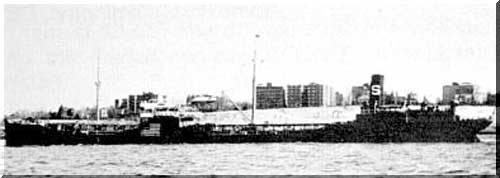Revision 8/29/2009 4:27 PM

|
Atlas
 Cape Lookout, NC Cape Lookout, NC
|
Max Depth: 91-100ft/28-30m
Average Viz: 61-70ft/19-21m
Entry Type: Boat
Bottom Composition: Sand
Aquatic Life: Plenty To See
|
Spring: 56-60°F/13-16°C
Summer: 76-80°F/24-27°C
Fall: 61-65°F/16-18°C
Winter: 50-55°F/10-13°C
|
|


|
|
Name: ATLAS
(previous names:
Sunoil [1927]
) Type: Tanker
Built: 1916 by Wm. Cramp & Sons Ship & Engine Building Co., Philadelphia, PA
Owner: Socony-Vacuum Oil Company, Inc.
Home Port: New York, NY
Size (ft.): 446’ 0" x 58’ 2" x 27’ 0"
Tonnage: 7058 tons
Propulsion: Oil-fired reciprocating steam/single screw/speed 10 knots
Date Sunk: 4/9/42
Cause: Torpedoed by U-552
Location: Cape Lookout, NC
GPS : N34° 31.689’/W76° 14.501’

SS Atlas (
11)
SHIP HISTORY; (
Gentile, Moore) The
SS Atlas was sailing alone from Houston, Texas to Seawarren, New Jersey loaded with 83,00 barrels of gasoline. At 0250 EWT, a torpedo struck the #6 tank on the starboard side causing gasoline to leak and shower the entire ship. The fumes were so strong that many of the crew had difficulty breathing. The Captain ordered an immediate abandon ship. A 2nd torpedo hit in the same area and set fire to the gasoline. Surrounded by fire, 11 of the crew had to abandon their lifeboat and swim through the flames. Two of the crew were killed in the process. These were the only deaths. One of the dead, Richard D. Lyons, Utility sailor, age 21, had his name used for a liberty ship. The
Atlas carried a crew of 34. The survivors were later spotted by a plane and picked up by a Coast Guard cutter. They landed at Morehead City, NC around 0800 on April 9th where they joined the survivors of the tanker
Tamaulipas, another
U-552 victim.
DIVING NOTES: Diving Depths: 80-125 ft.
Current: slight to moderate
Visibility: Usually less than 60 ft and sometimes far less; subject to the same wave action as the
Caribsea. Summer Temperature: mid 70s in summer with an occaisional thermocline
Points of Interest: Intact bow and stern with high relief and deck areas throughout the wreck; partially covered boilers, engine; steering quadrant, rudder and propeller; Anchor windlass and port and starboard anchors
Fish/Animal Life: Grouper, amberjacks, spadefish, etc. Shovelnose lobster seem to be quite common on this wreck plus many of the same animals which inhabit the near by
Caribsea. Description: The
Atlas is a large wreck which lies on sand mud bottom which is easily stirred up. The generally low, murky visibility makes it seem even larger than it is. The
Atlas is fairly contiguous and sits on its keel. Beware, as the decks and hull have collapsed, gaps have developed betweeen hull sections. Generally the hull pieces are in line, but in low viz it sometimes takes a big leap of faith to believe they are actually there when crossing the gap. The main gap is between the hull section with the engine/boilers and the bow. There are many sections where the deck and hull sections are intact and the wreck can be dived on many levels. The extreme bow point used be a separate, detached piece. It has now fallen away and collapsed. The anchor windlass is upside down. The port anchor is fully exposed while the starboard anchor is buried. As would be expected, the viz is generally much better near the top of the wreck than near the bottom.
http://www.nc-wreckdiving.com/WRECKS/ATLAS/ATLAS.HTML
Web site for videos of various wreck sites in the ar